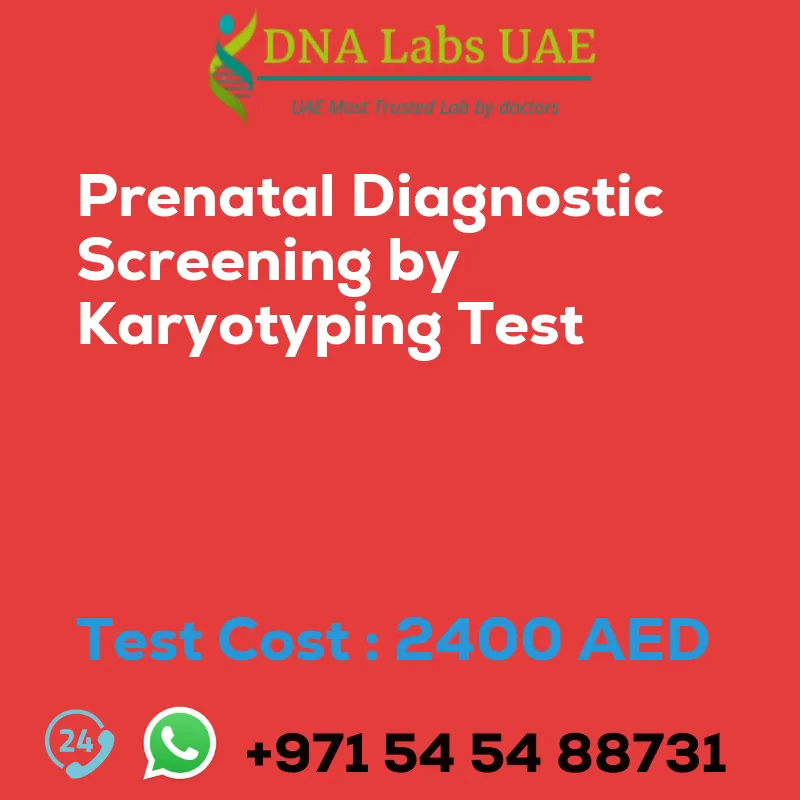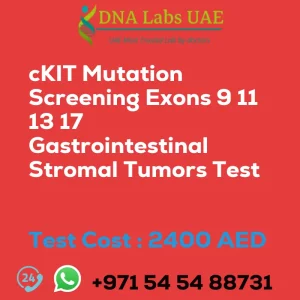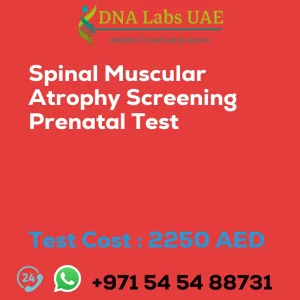Prenatal Diagnostic Screening by Karyotyping Test
Test Name: Prenatal Diagnostic Screening by Karyotyping Test
Components: 2 sterile tubes (15 ml. each) / Sterile tissue culture container
Price: 2400.0 AED
Sample Condition: Amniotic fluid / Bits of Chorionic tissue
Report Delivery: 15-20 days
Method: Cell culture
Test type: Genetics
Doctor: Gynecologist
Test Department:
Pre Test Information: Prenatal Diagnostic Screening by Karyotyping can be done with a Doctor’s prescription. Prescription is not applicable for surgery and pregnancy cases or people planning to travel abroad.
Test Details
Prenatal diagnostic screening by karyotyping is a genetic test that examines the chromosomes of a developing fetus to identify any abnormalities or genetic disorders. Karyotyping involves analyzing the number, size, and shape of the chromosomes in a sample of fetal cells obtained through procedures such as amniocentesis or chorionic villus sampling. During the procedure, the fetal cells are grown in a laboratory and then stained to highlight the chromosomes. The stained chromosomes are then examined under a microscope and arranged in pairs according to their size and shape. This allows the technician to identify any missing or extra chromosomes, structural abnormalities, or other genetic disorders.
Karyotyping is commonly used to screen for chromosomal abnormalities such as Down syndrome, Turner syndrome, Klinefelter syndrome, and other conditions caused by missing or extra chromosomes. It can also detect structural abnormalities such as translocations, inversions, or deletions that may lead to developmental or intellectual disabilities.
The results of a karyotype test can provide valuable information about the health of the fetus and help parents make informed decisions about their pregnancy. However, it is important to note that karyotyping is an invasive procedure that carries a small risk of complications, including miscarriage. Therefore, it is typically offered to women who have an increased risk of having a baby with a genetic disorder, such as advanced maternal age or a family history of genetic conditions.
In recent years, newer non-invasive prenatal screening tests that analyze fetal DNA in the mother’s blood have become available. These tests can detect many of the same chromosomal abnormalities as karyotyping, but without the need for invasive procedures. However, karyotyping remains an important diagnostic tool for identifying certain genetic disorders and providing more detailed information about the chromosomes.
Overall, prenatal diagnostic screening by karyotyping is a valuable tool in identifying chromosomal abnormalities and genetic disorders in the developing fetus. It allows parents and healthcare providers to make informed decisions about the pregnancy and plan for any necessary medical interventions or support.
| Test Name | Prenatal Diagnostic Screening by Karyotyping Test |
|---|---|
| Components | 2 sterile tubes (15 ml. each) / Sterile tissue culture container |
| Price | 2400.0 AED |
| Sample Condition | Amniotic fluid \/ Bits of Chorionic tissue |
| Report Delivery | 15-20 days |
| Method | Cell culture |
| Test type | Genetics |
| Doctor | Gynecologist |
| Test Department: | |
| Pre Test Information | Prenatal Diagnostic Screening by Karyotyping can be done with a Doctors prescription. Prescription is not applicable for surgery and pregnancy cases or people planing to travel abroad. |
| Test Details |
Prenatal diagnostic screening by karyotyping is a genetic test that examines the chromosomes of a developing fetus to identify any abnormalities or genetic disorders. Karyotyping involves analyzing the number, size, and shape of the chromosomes in a sample of fetal cells obtained through procedures such as amniocentesis or chorionic villus sampling. During the procedure, the fetal cells are grown in a laboratory and then stained to highlight the chromosomes. The stained chromosomes are then examined under a microscope and arranged in pairs according to their size and shape. This allows the technician to identify any missing or extra chromosomes, structural abnormalities, or other genetic disorders. Karyotyping is commonly used to screen for chromosomal abnormalities such as Down syndrome, Turner syndrome, Klinefelter syndrome, and other conditions caused by missing or extra chromosomes. It can also detect structural abnormalities such as translocations, inversions, or deletions that may lead to developmental or intellectual disabilities. The results of a karyotype test can provide valuable information about the health of the fetus and help parents make informed decisions about their pregnancy. However, it is important to note that karyotyping is an invasive procedure that carries a small risk of complications, including miscarriage. Therefore, it is typically offered to women who have an increased risk of having a baby with a genetic disorder, such as advanced maternal age or a family history of genetic conditions. In recent years, newer non-invasive prenatal screening tests that analyze fetal DNA in the mother’s blood have become available. These tests can detect many of the same chromosomal abnormalities as karyotyping, but without the need for invasive procedures. However, karyotyping remains an important diagnostic tool for identifying certain genetic disorders and providing more detailed information about the chromosomes. Overall, prenatal diagnostic screening by karyotyping is a valuable tool in identifying chromosomal abnormalities and genetic disorders in the developing fetus. It allows parents and healthcare providers to make informed decisions about the pregnancy and plan for any necessary medical interventions or support. |








